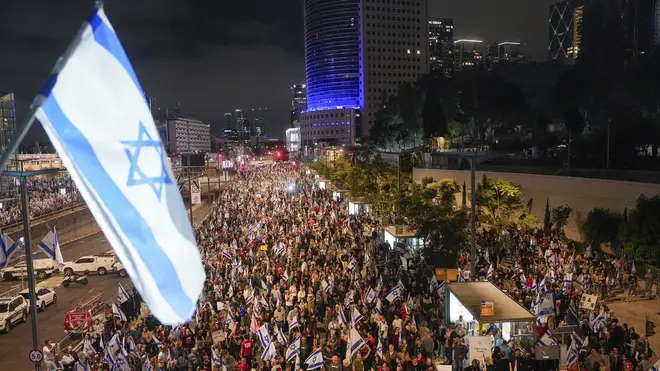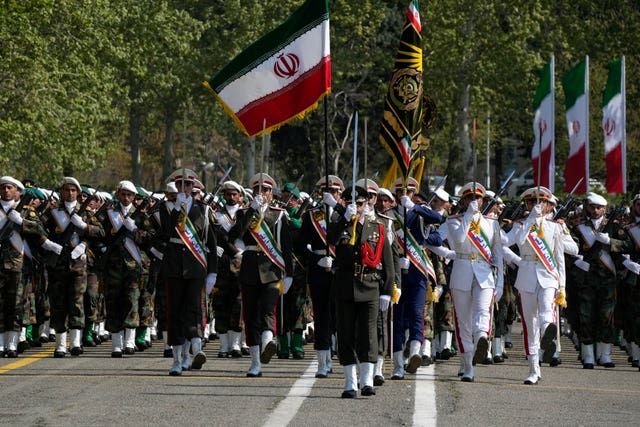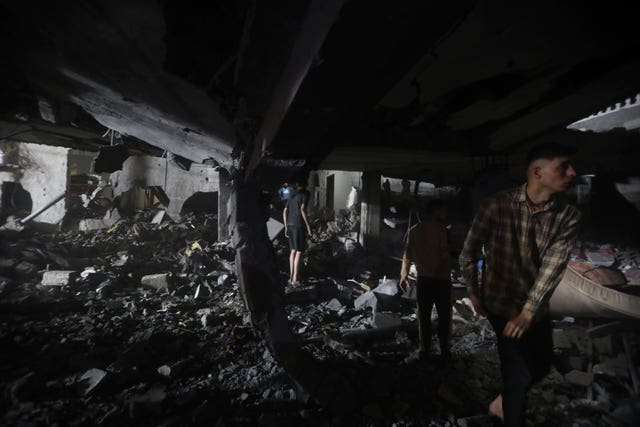
Clive Bull 1am - 4am
17 April 2024, 20:34

Foreign Secretary Lord David Cameron and German foreign minister Annalena Baerbock, who were on separate visits to the region, each appealed for calm.
Israeli Prime Minister Benjamin Netanyahu has said his country will be the one to decide whether and how to respond to Iran’s major air assault at the weekend, brushing off calls for restraint from close allies.
Israel has vowed to respond to Iran’s unprecedented attack without saying when or how, leaving the region bracing for further escalation after months of unrest linked to the ongoing war in Gaza.
Israel’s allies have been urging Israel since the attack to hold back on any response that could spiral.
These calls were repeated on Wednesday during visits by the British and German foreign ministers.
The diplomatic pressures came as Iran’s president warned that even the “tiniest” invasion of its territory would bring a “massive and harsh” response.
Violence meanwhile surged on Wednesday between Israel and the Iran-backed Lebanese group Hezbollah, which fired a volley of rockets on northern Israel.
The attack wounded at least 14 Israeli soldiers, six seriously, the army said.
The military said it struck Hezbollah targets deep inside Lebanon in response.
Speaking to a meeting of his cabinet on Wednesday, Mr Netanyahu said he met with both ministers and thanked them for their countries’ support.
But he said Israel would make the call on its own on how to respond despite “all sorts of suggestions and advice” coming from Israel’s allies, some of whom – including the US, UK and France – helped Israel repel Iran’s drone and missile assault.
“I want to be clear: we will make our decisions ourselves. The state of Israel will do whatever is necessary to defend itself,” Mr Netanyahu said.
Despite the tough rhetoric, Israel appears unlikely to attack Iran directly without at least the support of its top ally, the US.
But it could resort to more covert methods such as targeting senior Iranian commanders or Iran-backed groups in other countries, or launching a cyber attack.
It is unclear how Iran might respond given the heightened tensions.
Any miscalculation by either side risks setting off a regional war.
US President Joe Biden’s administration on Tuesday announced new sanctions on Iran and has worked to co-ordinate a global rebuke of the attack while urging all sides to de-escalate.
US officials said earlier this week that Mr Biden told Mr Netanyahu that Washington would not participate in any offensive action against Iran.
Over the weekend, Iran launched hundreds of missiles and drones at Israel in response to an apparent Israeli strike on Iran’s embassy compound in Syria on April 1 that killed 12 people, including two Iranian generals.
Israel says it and its partners successfully intercepted nearly all the missiles and drones.
A seven-year-old girl was wounded in the attack, which did not cause any deaths or major damage.
Israel and Iran have waged a shadow war for decades, but the strike over the weekend was the first direct Iranian military attack on Israel.
With tensions surging, Israel’s allies have reinforced a message of restraint.
Earlier on Wednesday, British Foreign Secretary Lord David Cameron and German foreign minister Annalena Baerbock, who were on separate visits to the region, each appealed for calm.
Lord Cameron said “it’s clear the Israelis are making a decision to act” against Iran, but he hoped they would do so “in a way that is smart as well as tough and also does as little as possible to escalate this conflict”.
He spoke after meeting Israel’s President Isaac Herzog, whose office is mainly ceremonial.
Ms Baerbock said Germany stands “in full solidarity with Israel” but called on it to exercise restraint.
“Everyone must now act prudently and responsibly. I’m not talking about giving in. I’m talking about prudent restraint, which is nothing less than strength,” she told reporters.
“Because Israel has already shown strength with its defensive victory at the weekend.”

The ministers said they would push for further international sanctions on Iran.
Iran’s President Ebrahim Raisi warned Israel against any retaliation as he addressed an annual army parade, which had been relocated to a barracks from its usual route and was not carried live on state TV – possibly because of fears that it could be targeted.
In remarks carried by Iran’s official IRNA news agency, Mr Raisi said Saturday’s attack was limited, and that if Iran had wanted to carry out a bigger attack, “nothing would remain from the Zionist regime”.
Regional tensions have soared since the October 7 attack on southern Israel launched by Hamas and Islamic Jihad, Palestinian armed groups supported by Iran.
The attack killed some 1,200 Israelis, and the militants took around 250 hostages.
Israel responded with one of the deadliest and most destructive military onslaughts in recent history, killing nearly 34,000 Palestinians, according to Gaza health officials, who do not distinguish between combatants and civilians in their count but say most of the dead are women and children.
Israel has withdrawn most of its forces from Gaza after major offensives that left its two biggest cities – Gaza City and Khan Younis – in ruins.
But Israeli officials say the war is not over and that they plan to send ground forces into the southernmost Gaza city of Rafah, where more than half the territory’s population of 2.3 million people have sought refuge from fighting elsewhere.

Hamas is still holding around 130 hostages, a quarter of whom are believed to be dead, and international efforts to broker a ceasefire and hostage release have made little progress.
Hezbollah, another close Iran ally, has traded fire with Israel along the border on a near-daily basis since the war began, in a low-intensity conflict that risks igniting all-out war.
Iran-backed groups in Iraq and Syria have also launched attacks, and the Iran-backed Houthi rebels in Yemen have targeted international shipping in the Red Sea, portraying it as a blockade of Israel.